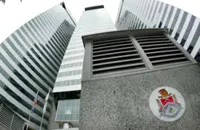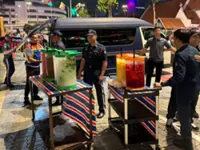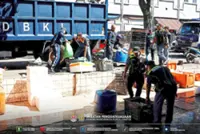APPLICATIONS for work near high-risk infrastructure − particularly gas pipelines − undergo stringent scrutiny, says Kuala Lumpur mayor Datuk Seri Maimunah Mohd Sharif.
She said the approval process was anything but simple.
“Any development project or utility works involving sensitive infrastructure like gas pipelines must go through several layers of approval, with checks by multiple departments before the green light is given,” she told StarMetro.
Maimunah was responding to safety concerns raised by various parties on social media in the aftermath of the Putra Heights gas pipeline explosion on April 1.
She explained that all applications for new development were scrutinised by Kuala Lumpur City Hall’s (DBKL) One-Stop Centre (OSC).
“If the proposed site is located above or near gas pipelines, we will refer it to the relevant stakeholders like PETRONAS or Gas Malaysia.
“If it is a highly sensitive zone, we will even refer the matter to the Chief Government Security Office (CGSO),” she said.
Sensitive areas include army camps and rail networks.
Maimunah said that for developers to obtain approval, they must submit all necessary technical reports to DBKL’s Civil Engineering and Drainage Department.
“Only when all reports are submitted and reviewed – ensuring there are no obstructions and that everything is safe – do we issue the development order.
“The same applies to utility companies applying for permits to carry out road digging works,” she elaborated.
The mayor said DBKL also has a utility committee that approved permits for digging works.
“Our SOP (standard operating procedure) is clear.
“There are conditions tied to each permit.
“That is why we insist that the companies submit the utility map of the area – it is compulsory,” she added.
Last August, StarMetro reported that as part of efforts to tighten oversight, DBKL requires contractors involved in excavation works exceeding 500m to submit daily progress reports via a dedicated WhatsApp group.
This allows DBKL to monitor compliance in real time and quickly address any breaches.
The reports are a compulsory condition of the excavation permit and are reviewed by various departments, including Civil Engineering, Urban Transportation and DBKL’s Integrity Unit.
According to Maimunah, there are approximately 120km of gas pipelines running beneath Kuala Lumpur, mostly concentrated in commercial areas in the city centre.
“Gas Malaysia has its own set of SOP, and they have installed gas markers in all areas where their pipelines are located.
“At the end of the day, every hole dug in the city must be done with accountability,” she said, adding that public safety was a priority and “shoddy work will not be tolerated”.
The gas pipeline explosion in Putra Heights, under Subang Jaya City Council, triggered a massive fire that injured more than 100 people and damaged or destroyed more than 200 houses.
While the actual cause of the explosion is still unknown, the incident has raised concerns over enforcement, coordination and the safety of underground utility networks across the Klang Valley.





